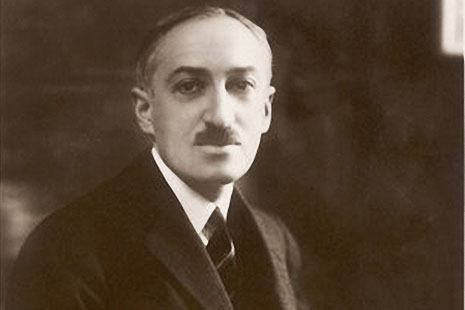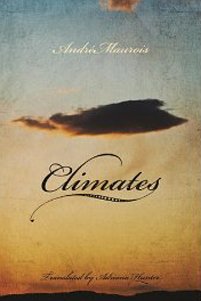Fuse Book Review: Inclement “Climates”
While reading Andre Maurois’s Climates you feel your world narrowing in uncomfortable ways.
Climates by André Maurois. Translated from the French by Adriana Hunter. Other Press, 367 pages, $15.95.
By Roberta Silman
André Maurois is primarily known as a prolific biographer of Shelley, Byron, Disraeli, Proust, and Victor Hugo, among others, and I clearly remember loving some of those biographies when I was discovering the Romantic English poets in college. Yet although this rather strange novel was a great success in 1928 when it was first published (comparisons to Tolstoy were made in praise of its psychological insights) and also when a new translation appeared in 1957, I don’t think Climates makes a good case for Maurois as a novelist. It gives ennui, which the French seem to love, and its corollary, self-absorption, new meaning in their ability to bore.
Maurois, who was born Emile Herzog in 1885 to an assimilated, Jewish textile manufacturing family, took a pseudonym that would sound more French than German, according to Sarah Blakewell who wrote the Introduction to this edition, but his Jewishness always seemed to be something that needed to be hidden. During the Second World War, which Blakewell calls “the Occupation,” he and his second wife, Simone, were lucky enough to live in the United States, then returned to France where his wife ran a “salon” for artists and writers at their country place in Périgord; the family’s textile mill floundered in the fifties, and their estate then thrived as an apple orchard. He died in 1967.
Climates is touted as an examination of love, and, indeed, its form is that of two meditations: Part One, called “Odile” in the form of a long letter from Philippe Marcenat to his second wife, Isabelle de Cheverny, about his first wife, the enigmatic, charismatic Odile; and Part Two, called “Isabelle,” his second wife’s letter to Philippe. In the first part, we see a tortured man who loves his wife more than she seems able to love him; in the second part, we see a tortured woman who loves her husband more than he seems capable of loving her. The title of the novel refers to the clothes, houses, furniture, flowers that surround the lovers, those things that create an environment for people as they go through their daily lives. All of that is laid out in an accessible, though hardly charming way.
My problem with this novel is with the people. They are narcissistic to the point of pathology, they don’t seem to take anything seriously except their relationship to each other, and their ways of expressing themselves are often very stilted, especially when they are unhappy, which seems to be most of the time. Whether this is due to the new translation by Adriana Hunter or whether this is Maurois’s fault, I do not know, because I haven’t seen the book in French. But their stories rarely come alive and thus fail to engage the reader.
Most important, these languid people don’t seem able to fight for anything that really matters to them—when Philippe realizes Odile is having an affair, it is too late because he has refused to confront any of her odd previous behavior with anything that resembles a normal reaction. So he becomes his own victim, and what he has perceived as a great love recedes into something almost laughable. Here he describes the end of his first marriage:
I had known for a long time that it would end like this, and even her behavior during Francois’s time in Paris had persuaded me that I would be better off not seeing her anymore. And yet the first thought that crossed my mind was a petty one; no Marcenat had ever been divorced and I would feel terribly humiliated when I told my family about this drama in the morning.
Actually, the book does become more interesting in the second part, and Isabelle is certainly more engaging than Philippe as she realizes she is competing not only with the memory of Odile but also dealing with a constantly unfaithful husband. Here she is trying to analyze her no-win situation:
We are wrong to say love is blind. The truth is that love is indifferent to faults and weaknesses it can see perfectly clearly if it believes it has found in someone an often indefinable quality that means more to it than anything else. At the bottom of his heart Philippe knew, although he may not have admitted it to himself, that I was a shy, gentle, and unremarkable woman, but he needed me there. He wanted me to be prepared to leave everything in order to be with him. I was not his wife or his mistress, yet he seemed to demand utter fidelity.

André Maurois — his novel gives ennui, which the French seem to love, and its corollary, self-absorption, new meaning in their ability to bore
Like Philippe Marcenat’s mother, I liked Isabelle and felt she was the only really promising character, but just as my affection was growing, fate intervened, and she was robbed of any possible chance for real happiness. This rather schematic ending exasperated me even more; it seemed a short cut in a novel that was largely autobiographical, but the leap from autobiography to fiction is a mysterious one that seems to have eluded Maurois. So what we are left with are two dramatic monologues—the second more dramatic than the first—but not really an important piece of prose fiction.
What makes the love stories in Tolstoy so compelling is that they are told against the backdrop of society, with a cast of unforgettable, complex characters. Try to imagine Anna Karenina with only Anna and Vronsky and you get the idea. Love is most interesting when people beside the lovers are aware of and partake in it; that’s why marriages have been community affairs for centuries.
And although comparisons with Proust have been made, they don’t really hold; only in a few places does Maurois’s language soar—most noticeably, when Philippe is madly in love with Odile soon after they marry. After that love begins to fade, we are treated to what he calls his “invincible boredom,” and the prose for the rest of the first part becomes a chore. Moreover, although Maurois is writing about the various permutations that love can take, inviting more talk about Proust, the latter’s great novel is about a lot more than love and while reading it you can feel your world expand. While reading Climates, you feel your world narrowing in uncomfortable ways. That may have been Maurois’s intent, and it is not up to me to tell anyone how to write his novel, but why anyone now—young or old—would choose to pick up this book is quite beyond me.
Roberta Silman is the author of Blood Relations, a story collection; three novels, Boundaries, The Dream Dredger, and Beginning the World Again; and a children’s book, Somebody Else’s Child. Her newest short story “The Sugar Road” can be found in the Digital Edition of The American Scholar. She writes regularly for The Arts Fuse and can be reached at rsilman@verizon.net.
Tagged: André Maurois, Climates, French literature, Other Press

